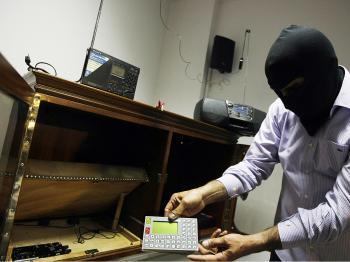BEIRUT, Lebanon—Ziad Baroud, Minister of the Interior, increased his popularity one more time among Lebanese, when he issued a memo allowing removal of religious affiliation from official records.
Since he was first assigned, Baroud made significant changes to the country’s regulations, which strengthened people’s hope for a reformed country. Starting with penalizing violations of traffic laws, then drafting a law allowing Lebanese women married to foreigners to grant their nationality to their children, Baroud, a lawyer and human rights activist, issued on Feb. 11 a memo for registrars to accept requests for removing the religious affiliation from public records.
Many Lebanese and human activists applauded this decision and considered it a move toward a secular country. People will be relieved from being treated according to their religious sect, while still practicing their religion freely; it is a decree that separates religious belonging from civil rights.
However, the civil rights system in Lebanon is based on the 18 different religions of the country. Each religion has specific courts and different laws to abide by. Should this sectarian system remain unchanged, those who had their religious affiliation removed will have their records removed from religious courts, so they will have no court to refer to when they want to get married, divorced, demand child custody, or adopt a child.
As a result, Human Rights Watch urged the Lebanese authorities, after issuing this regulation, to adopt new civil laws and a secular national registry as the next move to protect non-sectarians’ rights. “The government needs to take the next step and ensure that all Lebanese can have access to personal status laws that are not religiously-based and provide for equal treatment,” said Nadim Houry, senior researcher at Human Rights Watch. Otherwise, Baroud’s initiative would be inapt and troublesome.
Another area of concern is the sectarian representation in the government. The political system is also deeply rooted in sectarianism, as governmental seats are selected on a sectarian platform. Those who are not Maronites can’t be presidents; those who do not belong to any religion can’t run to become a member of Parliament. Therefore, political laws should also be adjusted to allow the representation of the new “non-sectarian sect” in the parliament.
Article 9 of the Lebanese Constitution grants citizens the right of choosing their own religion, but fear remains from religious authorities who might lose power if such a reform was fully applied. If followed up, this bold move would lead to more changes at different levels in civil regulations.
Since he was first assigned, Baroud made significant changes to the country’s regulations, which strengthened people’s hope for a reformed country. Starting with penalizing violations of traffic laws, then drafting a law allowing Lebanese women married to foreigners to grant their nationality to their children, Baroud, a lawyer and human rights activist, issued on Feb. 11 a memo for registrars to accept requests for removing the religious affiliation from public records.
Many Lebanese and human activists applauded this decision and considered it a move toward a secular country. People will be relieved from being treated according to their religious sect, while still practicing their religion freely; it is a decree that separates religious belonging from civil rights.
However, the civil rights system in Lebanon is based on the 18 different religions of the country. Each religion has specific courts and different laws to abide by. Should this sectarian system remain unchanged, those who had their religious affiliation removed will have their records removed from religious courts, so they will have no court to refer to when they want to get married, divorced, demand child custody, or adopt a child.
As a result, Human Rights Watch urged the Lebanese authorities, after issuing this regulation, to adopt new civil laws and a secular national registry as the next move to protect non-sectarians’ rights. “The government needs to take the next step and ensure that all Lebanese can have access to personal status laws that are not religiously-based and provide for equal treatment,” said Nadim Houry, senior researcher at Human Rights Watch. Otherwise, Baroud’s initiative would be inapt and troublesome.
Another area of concern is the sectarian representation in the government. The political system is also deeply rooted in sectarianism, as governmental seats are selected on a sectarian platform. Those who are not Maronites can’t be presidents; those who do not belong to any religion can’t run to become a member of Parliament. Therefore, political laws should also be adjusted to allow the representation of the new “non-sectarian sect” in the parliament.
Article 9 of the Lebanese Constitution grants citizens the right of choosing their own religion, but fear remains from religious authorities who might lose power if such a reform was fully applied. If followed up, this bold move would lead to more changes at different levels in civil regulations.





